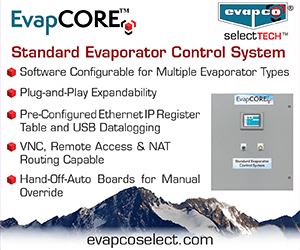IIAR Congratulates 2020 Award for Presentation Excellence Winners
Perhaps it was the prospect of ad-hoc entertainment such as intrusive pets, children, or spouses, but IIAR Educational Director David Sainato said, “this year’s technical program was one of the strongest in recent history, as evidenced by the robust attendance for each session.”
IIAR technical paper presenters embraced safe social distancing with the new format and didn’t miss a beat presenting via webcast from their homes or offices, with active question-and-answer periods. Members followed up by choosing the top presentations through electronic voting.
The technical program schedule included 18 technical presentations in the two categories: commercial and industrial, with a wide range of topics that included safety, energy efficiency, best practices, maintenance, installation, and operating costs, addressing the industry’s most timely and technologically significant issues.
Members voted electronically for the first time and picked two to receive the 2020 IIAR Award for Presentation Excellence, one each category in the industrial and commercial/retail categories.
THE WINNERS WERE:
- Technical Paper #7 (Industrial), “Review of Accidents in the Ammonia Refrigeration Industry,” by Peter Jordan of MBD Risk Management Services, Inc.; and
- Technical Paper #15 (Commercial/ Food Retail), “Study of Package Chiller Systems – Comparison of Natural (NH3 and CO2 ) and HFC Refriger ants,” by John Collins, Zero Zone.
Because the education sessions, as well as the entire conference, were online, voting for the presentation excellence awards was pushed into an entirely electronic format, which Sainato said offered some unanticipated advantages.
Sainato said the necessary change to “all-electronic” voting this year was a good push to a more efficient, accurate, and reliable system for the long run, one that will better serve the organization, its members, and the environment. “The virtual conference expedited the full implementation of digital ballots to vote and tally awards for excellent presentations,” he said. “In years past we’ve relied heavily on a paper ballot system to tally votes for the awards.” “While we’ve moved towards electronic voting through the IIAR conference app, we still were making paper ballots available. But, when the in-person IIAR conference was canceled and we switched to the virtual conference format this year, the decision to rely solely on electronic voting was made for us, and we relied on the app to collect this year’s votes.”
In addition to voting electronically, attendees were asked to use the app to rate the sessions they attended, and Sainato said the digital format helped to collect more comprehensive feedback on the educational program as a whole in a level of detail that paper ballots did not offer. He said the app’s ability to collate and organize feedback will help improve programming for the future.
“As we were forced to move from an onsite conference to an online model as a result of the pandemic, IIAR was grateful that our speakers agreed to stick with us and lend their time and expertise on behalf of the virtual conference. As a result, this year’s technical program was one of the strongest in recent history, as evidenced by the robust attendance for each session,” he said.













